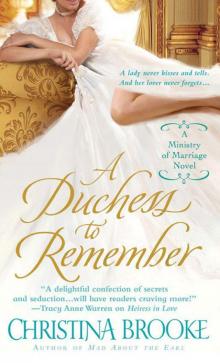- Home
- Christina Brooke
A Duchess to Remember Page 2
A Duchess to Remember Read online
Page 2
But Montford had been unmoved by her antics. Looking back, she rather thought they’d amused him. Now, she enjoyed the challenge of making Montford smile at her tricks. Then, she’d found his equilibrium infuriating.
And here she was, twenty and making her debut this spring. And at the height of the season, she was to be married to the man her parents had chosen for her when she was little more than an infant.
She looked down at the journal’s brown leather cover. Why hadn’t Lavinia sent this to her years ago? Cecily had so little to remember Jonathon by. Bertram inherited everything that was Jonathon’s, even her brother’s personal belongings. She wondered exactly how many of Jonathon’s writings Lavinia had cold-bloodedly sold to the Duke of Ashburn.
One thing was certain: Cecily needed to retrieve that letter.
Perhaps there was no need for concern. Perhaps the letter had been overlooked, discarded, buried under a superfluity of other documents and notes Jonathon had amassed over the years.
But she could not be sure, could she? What if the forthcoming announcement of her betrothal caused someone to make the necessary connection? If that letter became public, her chances of marriage would be ruined. She might be ruined into the bargain.
Running her fingertips over the diary’s tarnished clasp, Cecily paused.
Ought she to open it? Diaries were private things, after all. She’d not have dreamed of reading it if Jon were alive.
But the longing for him was so strong that such scruples seemed irrelevant. She needed to read his thoughts, hear his voice, if only through his words on the page.
She muttered, “You wouldn’t mind now, though, would you, old thing? I know you would not.”
With a deep, unsteady breath, Cecily opened the diary. She hoped for something. She didn’t know what. A connection, perhaps? A balm to the ache inside her that never went away?
The scant lines of bold, hasty handwriting did not comfort her or assuage her lingering grief. Disappointment spiked through her. The diary was little more than an appointment book. All these places and times at which her brother had been alive and present. And now, no more.
Her brow furrowed as she scanned the pages. One item repeated—she flipped back and forth—monthly. Hmm. The Promethean Club. What was that? She’d never heard of it before.
Clearly, it was not an ordinary gentlemen’s club like White’s or Brooks’s, for its meetings were held at Ashburn House, the town residence of the Duke of Ashburn. Cecily thumbed through more pages but couldn’t find any other details that would enlighten her.
Ashburn had become a recurring theme in this particular story. What did he have to do with Jonathon? What did he want with Jonathon’s papers?
She needed to find out. But most of all, she must get that letter.
Chapter Two
London, spring 1816
Rand, Duke of Ashburn, eyed his nineteen-year-old ward. Lord, male adolescents were even more tedious than the fresh-faced debutantes Lady Arden insisted on throwing at him this season.
“Of all places to accost me and demand money, surely a ball must be the worst,” Rand remarked.
He’d called for his carriage, his coat, and his hat and stood in the entry hall of Lady Eversleigh’s house, waiting for them to be fetched. If he had to waste much more time on this discussion, he’d be late for the meeting of the Promethean Club. As he was to host the meeting, that would be bad form. Besides, a fascinating development had made him anticipate the gathering with more than usual interest.
Rand watched the flush rise in his cousin’s face with a sense of fatalism mingled with distaste. He detested public scenes. Or scenes of any variety, for that matter.
Stiffly, the young man said, “I should scarcely accost you here were you ever at home to me when I call.”
And if you ever called on me for reasons other than money, I might be at home to you more often.
Boredom crept over Rand. “Your financial woes are not of the smallest interest to me, Freddy. Last time, I warned you I’d no longer pay your debts if you continued along your present habits of extravagance. You said you’d go to the Devil your own way. Well, bonne chance, my dear cousin. I’m not stopping you.”
His young relative forced the words out between rigid lips. “But it’s a debt of honor, Your Grace—”
“Oho, Your Grace, is it?” said Rand, grimly amused. “Come off your high horse, Freddy. It doesn’t suit you, believe me. If you can’t stand the nonsense, don’t play.” Mildly interested, he added, “To whom is this debt owed?”
“The Earl of Davenport.”
Now that was interesting. “Exalted company you keep,” Rand remarked.
In Davenport’s shoes, Rand or any other gentleman worthy of the name would have found a way to avoid gaming with a nineteen-year-old greenhorn. But Davenport had lately developed the habit of fleecing the young, wealthy, and inexperienced gentlemen who thought themselves far cleverer at games of chance than they were.
Rand would not go so far as to accuse Davenport of cheating, but such behavior might get him ejected from his clubs if he wasn’t careful. If the earl wasn’t careful, Rand might see to it himself.
“And, er, exactly how much do you owe Lord Davenport?” he asked his cousin.
Freddy’s expression turned first hopeful then anxious. The lad hadn’t quite grown into his Adam’s apple; it bobbed with distressing prominence as he swallowed hard. “R-rather a large sum, one might say.”
“Indeed?” Rand waited.
“One thousand pounds!” Freddy blurted out.
Rand had expected worse. “How unfortunate for you,” he said politely. “Will the earl wait until next quarter day?”
“Of course he won’t!” Freddy said, clearly amazed at Rand’s obtuseness. “Everyone knows a debt of honor must be paid at once.”
“Everyone but you, it seems,” said Rand. “Or did you rely on me rescuing you, yet again? I meant what I said, Freddy.”
“But that was over tradesmen’s bills! No one cares if they go unpaid.”
“I expect the tradesmen care,” said Rand, but his relative took no heed of that interjection.
“Damn it, you’re a cold fish, Rand. I ought to have known you wouldn’t help me,” Freddy said.
“If you had, you might have curbed your gaming habits,” agreed Rand. “And don’t think for one moment of going to moneylenders to solve your problems, because you’d only replace them with far greater ones. Besides, and far more terrifying, if you do that, I will hear of it and then you will have me to deal with.”
Freddy’s shoulders slumped. “So what am I to do?”
Rand flicked a piece of lint from this dark sleeve. “Sell off your horses. They ought to bring in sufficient funds, I should think. I’ll even find you a buyer if you like. You may be a cloth-head when it comes to cards, but no one can fault your judgment of horseflesh.”
“Obliged to sell my horses like some moth-eaten bankrupt?” Freddy demanded, outraged. “Why, I’m the heir to a dukedom!”
With that statement, his own mortality slammed into Rand like a fist. Provoked and annoyed that the silly boy had landed such a blow without even knowing it, Rand managed a short, mirthless laugh. “Don’t count on stepping into my shoes, Freddy. I’ll be married by the end of the season.”
Ruefully amused at his own absurd vulnerability—he was only nine-and-twenty, for God’s sake!—Rand watched his relative storm off.
He’d leave Freddy to stew in his resentment and growing fear for a few days. After that, he’d undoubtedly come to the boy’s rescue. But he would exact his own pound of flesh in exchange for such beneficence. These days, he gave nothing away freely. Not even to his favorite relative.
That Freddy was his favorite relative said a lot about his family, didn’t it?
“Forget the carriage,” he told a hovering footman. “I’ll walk.”
Before he could make his escape, someone hailed him. He turned to see the Duke of Montford reach hi
s side. The duke had already donned his coat and stood with his chapeau bras and cane in hand.
“Evening,” said Rand with a slight bow. He respected Montford as a worthy adversary in the House of Lords, but he didn’t altogether like him.
The man was perceptive and intelligent, but like so many of his ilk, his thinking was hampered by the desire to arrest the march of progress. Or, at least, stall it for as long as humanly possible.
Change was coming. You could smell it in the air, but the old guard wanted to ignore it, suppress it, stamp it out before it could flourish and threaten their comfort. Rand was too curious to be afraid of innovation. He embraced it. He wanted to explore its potential, to harness it, not smother it into oblivion—or rebellion.
Montford sent a significant glance after Frederick. “A troublesome age.”
Rand nodded curtly. “Well, you would know.”
Montford was famed for the unusual step of taking six of his wards under his own roof and bringing them up together. Rand suspected it hadn’t been an easy road to choose. Any other man in Montford’s position would have farmed the children out to other households in the family and concerned himself only with their financial welfare. He wondered why Montford had taken them under his wing.
“May I walk with you?” asked Montford as Rand received his hat and coat from a footman.
With a gesture that said be my guest, Rand allowed Montford to precede him into the night air. They descended the steps and turned in the direction of Rand’s house.
The pavement gleamed wetly, washed by recent rain. The air was crisp and cold. Spring had not yet breathed warmth into London.
“He’ll come about, I’m sure,” said Montford, picking up the subject of Freddy where Rand would have preferred to leave it.
“I don’t doubt.” Despite his harsh reaction to the news of this latest debt, Rand would not discuss Freddy’s affairs with anyone.
“A wife can be a steadying influence, even on one so young,” remarked Montford.
Oh, no, you don’t.
Montford was head of an organization nicknamed the Ministry of Marriage, in which the heads of various aristocratic families negotiated and approved marriages between members of their respective dynasties. Technically, Rand was entitled to a seat in that illustrious circle. He’d never taken it up, however, and he didn’t intend to allow either Freddy or himself to be caught in the ministry’s clutches.
Rand flicked a sideways glance at the duke, who sauntered along, swinging his cane with his habitual elegant nonchalance. “Luring me to your precious Ministry of Marriage to bargain with my ward’s future, Your Grace? Not a chance in hell.”
“Your vehemence does you credit,” murmured Montford, not in the least perturbed by the summary rejection of his overture. “But it was mere friendly advice. I dared not hope you would consider appealing to the ministry after such a longstanding and adamant opposition to our practices.”
Rand made no answer.
“One wonders what your matrimonial plans might be, Your Grace.”
Rand clenched his teeth. Montford was nothing if not persistent. And impertinent. No other man in England would dare ask Rand such a question. Only one woman would.
Montford continued. “Lady Arden seems desperate to find you a suitable wife this season. And yet, there are those with equal experience and expertise in arranging such matters.”
Rand decided to play along for the moment. “What could your precious ministry do for me that I can’t do very well for myself?”
Montford waved a gloved hand. “Oh, all manner of things, I should imagine. We can select a young lady for you who has been brought up knowing how to conduct herself as a duke’s wife should, one who entertains no romantic notions of love or any nonsense of that nature. The unmarried ladies of our families know how such marriages should be conducted.”
“Indeed?” Rand injected a wealth of indifference into the comment.
In spite of himself, he acknowledged the idea had much to recommend it. Oh, he wasn’t about to become involved in the complicated marital negotiations facilitated by the Ministry of Marriage—that group of power-hungry nobles bent on arranging the most advantageous marriages for their families. He most certainly would not subject anyone in his family to their rule. He believed young people should marry for love if they possibly could.
But for himself … He had never fallen in love, as the saying went. Perhaps he did not have the capacity for such violent, all-encompassing emotion. Freddy’s words had struck true. Rand was, indeed, cold at heart.
He needed a wife soon, if only to nip in the bud any expectations Freddy might harbor of inheriting the dukedom.
Perhaps it was time to put away self-indulgent leanings and make a practical marriage. He was a duke, after all, and he owed it to his name and to his family to make a brilliant match. He owed it to Freddy to father sons before Freddy became one of those pathetic idlers who lived on expectations that would never be fulfilled.
However, it wouldn’t do to let Montford gain the slightest whiff of his interest.
Abruptly, he said, “I’m obliged to you for your, er, concern. But if and when I decide to marry, I’ll do it without assistance—either from Lady Arden or your precious Ministry of Marriage.”
Chapter Three
Cecily shrank into the shadows outside the Duke of Ashburn’s house as another carriage rolled to a stop.
She peered from behind a stone pillar that supported the grand steps to the house, wishing she could see better in the dark. Impossible to identify the duke’s guests in this light as they traveled the short distance from their carriages to the foot of the stone staircase.
She could hear them, though. Cecily strained for snippets of information she might gather from the gentlemen’s conversation as they passed. Anything that would give her the smallest clue about the purpose of the club, who its members were, anything that would help her make some sense of Ashburn’s connection to her brother.
She couldn’t distinguish much from the general murmur of voices. What she could make out seemed to range from philosophical debate to political gossip to astronomy. Fascinating, but of little practical use in her investigation and none at all in identifying the speakers themselves.
What sort of a club was this? Prometheus was the Greek who’d stolen fire from the gods and was tortured for his impudence for eternity. The name suggested a drive for advancement, new discovery, perhaps in a manner that was highly subversive.
That sounded exactly like Jonathon.
An unwelcome thought occurred: Perhaps the club had been founded for more illicit purposes than scientific advancement. Perhaps the fire to which the name alluded was hellfire, and the club was some offshoot or resurrection of Dashwood’s scandalous Hellfire Club. Black masses and depravity.
No, she could not see Jonathon as a party to activities like that. Nor did tonight’s host, the Duke of Ashburn, have the reputation of a satyr. Much as the ladies might whisper behind their fans of his prowess in the bedchamber.
The steady stream of arrivals slowed to a trickle. She’d not discovered nearly enough for her purposes. She needed to know more.
Cecily turned to slip inside but stopped short when she heard a distinctive, loud bray of a laugh.
The hairs on the back of her neck raised. She’d know that laugh anywhere. In fact, it was the one thing about him she absolutely could not abide.
That laugh was the sole property of her betrothed, the Duke of Norland.
What on earth was he doing here?
She thought it over and realized his presence was not such a strange coincidence as one might suppose. Norland was a notable scholar and he’d become something of a mentor to Jonathon after their father died. Perhaps he was the reason Jon had joined the club in the first place.
Any lingering suspicion that the Prometheans traced their origins to the Hellfire Club vanished. Her betrothed was far too mild-mannered and staid for that kind of thing.
&n
bsp; Norland went inside and the wheels of his carriage crunched on the drive as it rolled away. Under cover of the sound, Cecily edged around to the back of the house.
She passed a kitchen garden redolent of herbs and the earthy scent of newly turned soil. Her courage wavered as she approached the kitchen door, but she steeled her nerves to go on.
She’d expended too much thought and preparation over what she was about to do to turn back now. It had taken weeks of careful planning, reconnaissance, and the dispensation of a considerable amount of money to reach this crucial point. Her next opportunity to spy on a meeting of the Promethean Club wouldn’t come for another month.
Pressing her hand to the doorframe, she listened intently for any sound from within. She’d paid a footman an exorbitant bribe to leave this door on the latch.
The footman had assured her there’d be no one to see her slip inside the Duke of Ashburn’s mansion at this hour. When the Promethean Club gathered, the duke invariably instructed his staff to prepare a sumptuous buffet in the dining room and make themselves scarce.
What did that suggest? That the society was secret—illicit, perhaps? That the duke’s guests wished to remain anonymous?
Her heart pounding, Cecily tried the door.
It was unlocked, just as the footman had promised. With a rush of relief that spiraled into anticipation, she eased it open. The big, heavy door swung inward, silent on well-oiled hinges.
For some reason, that silence struck her as more ominous than an eerie creak would have done.
Oh, she was as jittery as a cat on hot bricks! But then, why shouldn’t she be? Not only was she housebreaking, she was entering the Duke of Ashburn’s domain.
Ashburn was renowned as hard and uncompromising, with a sharp intelligence that bordered on omniscience. His friends numbered among the most powerful leaders, the brightest wits, the greatest talents of the day. He was a true Renaissance man, accomplished at a vast array of pursuits, most notoriously amorous ones. One mistress of the duke’s—a famous courtesan—had claimed she ought to pay him for his services in the bedroom.

 Heiress in Love
Heiress in Love The Greatest Lover Ever
The Greatest Lover Ever Mad About the Earl
Mad About the Earl The Wickedest Lord Alive
The Wickedest Lord Alive Heiress in Love (Ministry of Marriage Novels)
Heiress in Love (Ministry of Marriage Novels) A Duchess to Remember
A Duchess to Remember London's Last True Scoundrel
London's Last True Scoundrel